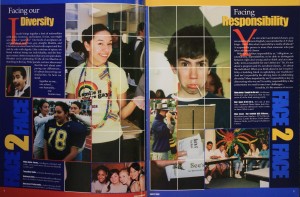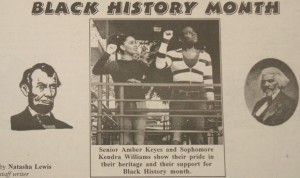2000s

“Facing our Diversity”
Lincoln brings together a host of nationalities with unity, harmony and balance. In fact, you might say we have “good chi.” Our levels of acceptance are not just about race. Here, gay, straight, Muslim, and Christian can stand hand in hand with respect and live side by side with dignity. Like a mixture of spices we blend without losing our individuality, and the bouquet creates a better sensation than any one spice alone. Whether we’re celebrating El Dia de los Muertos or marching in the Gay Pride parade, we have discovered that life isn’t about comparing our differences, it’s about discovering our similarities. So here we stand, together as one… one school… one humanity… one human race.
“Facing Responsibility”
You can select accelerated classes, you can enroll in Honors English, you can take the AP challenge… but is this what responsibility is really all about? A responsible person is more than someone who just takes advanced classes. Webster defines responsibility as “obligations, accountability, dependability; to be able to distinguish between right and wrong and to think and and act rationally; to be accountable for one’s behavior.” So it’s not about a program and it’s not about classes… it’s about the individual. When you think about it, isn’t responsibility a building block in upholding our traditions? And isn’t responsibility the driving force in celebrating diversity? More importantly, isn’t responsibility a key in discovering who we are? In reality, responsibility is the cornerstone we need to meet our challenges… in reality, it’s the essence of success.
###

“Black History Month”
by Natasha Lewis
###
Before 1926, Black leaders had not been recognized for their contributions to advance America. There was no holiday or month in remembrance of those who suffered through slavery, or of those who fought for the advancement of black people. However, that all changed when Dr. Carter Goodwin Woodson dedicated his life to studying the history of African Americans.
Dr. Woodson, known as the “Father of Negro History” was born in New Canton, Virginia, in 1875. His grandparents and his parents had all been slaves.
Wanting to educate the world about Black history, Woodson founded the Association For The Study of Negro Life and History in 1915 (later renamed Association for The Study of African American Life and History, in 1976). In 1916, the association issued the Journal of Negro History, which recorded backgrounds, experiences and writings of African American ancestry, making blacks aware of their influence on society.
Woodson’s efforts led to the launch of Negro History Week in 1926, which was originally celebrated the second week of February. Dr. Carter Goodwin Woodson chose the month of February because the two people he believed had the greatest impact on the lives of African Americans, were born in this month. Those people were Frederick Douglass, a famous leader of the abolitionist movement, and Abraham Lincoln, the sixteenth president, who fought to abolish slavery.
After years of fighting and educating, The Association for The Study of African American Life and History, succeeded in turning Negro Week into Black History Month. Thanks to their dedication there is an entire month recognizing famous African American leaders, activists, and writers such as Martin Luther King, Rosa Parks, Malcolm X, Maya Angelou, Frederick Douglass, and all those who fought for the rights of black people.
ASB Justice, Amber Keyes, describes Black history month as a “remembrance to those who contributed to the black legacy,” while fellow classmate Sophomore Class President Kendra Williams says that Black history month has helped her understand where she came from and how much better she has it than her parents and grandparents.
For these girls and other African Americans, Black History month is a time to celebrate the struggles the black community has overcome, and to honor those who made the world better for today’s African American youth.
###

